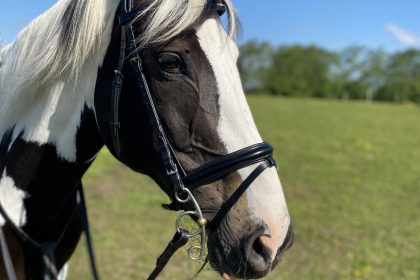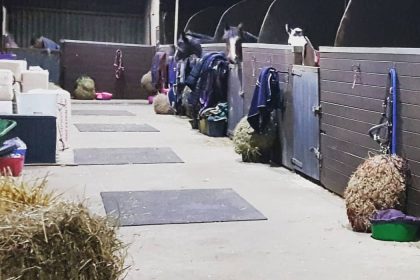TARGETED WORMING
How do horses pick up worms in the first place? From grazing their fields and from their bedding. Worm eggs or worms themselves come out of your horse via his or her poo. What exactly does targeted worming mean?
Targeted worming means that only the horses which show that they are carrying worms, are given worming medication.
The old fashioned way of worming was to give worming medication to every horse in a yard or field at the same time and to continue to do that throughout the year at specific times. This was done in the hope it would kill the various types of worms. This meant lots of chemicals being given to the horses.
Resistance to ‘wormers’ (worming medication/drugs) is on the increase. Just like antibiotics for us – the wormers have stopped working because the worms learned and developed over the years. The worms now know how to beat and ignore the some of the chemical drugs in the wormers – some drugs therefore no longer work so well.
Today however, most horse owners realise that because of resistance issues, it now is absolutely VITAL to use a targeted worming programme for each individual horse.
What is a targeted worming programme? It simply means we use tests to see what worms the horses are carrying. Different worms, need different tests. The tests are by faecal (poo) egg count, by blood test, or by saliva test. Any tests which come up as clear means that horse does not need any medication – so less chemicals for the horse and less money spent by you.
There are three main worms we treat with targeted worming and we treat them at different times of year. Adult small redworm – is targeted / treated March – September ( test b y Faecal Egg Count) Young or larvae stage of the small redworm this is targeted/ treated October – February (test b y Blood Test) At the end of the Summer, these young worms will have buried themselves in stomach wall and formed little cysts – i.e. they are encysted. This is called They spend the Winter living there and emerge en masse as the weather gets warmer in Spring – this is called cyathostominosis. Some horses are more vulnerable than others to this. This eruption of lots of worms from the stomach wall causes diarrhoea, colic and sometimes this results in death. We therefore treat them in Autumn to prevent them becoming encysted.
3. Tapeworm – September – Treated in November – (test by Saliva Test) We used to treat Tapeworm in Spring but we now know that with direct targeting it is not now necessary to treat in Spring When to test and what wormers / drugs do we need? the Small Redworm needs a Worm Egg Count test. Target & test this one any time from March – September and if positive use an Ivermectin based drug – found in these brand name wormers Animec, Eqvalan, Eraquell, Noromectin, Or a pyrantel based wormer: Strongoid-P, Embotape, Pyratape P.
Encysted small redworm: Needs a Blood Test in early Autumn. If positive treat in Autumn. The ONLY drug that will kill these is Moxidectin – which is in the wormer brand name Equest. IMPORTANT NOTE: We should not use Equest at ANY other time of year so that the worms do not build immunity to it. Preserve Equest for preventing larval cyathostominosis which as we said can be fatal. Tapeworm is tested by a Saliva Test – or a blood test. Tapeworm is treated anytime the saliva/blood test shows positive. Treat with one of 2 drugs: Praziquantel or pyrantel (but at a double dose). These are the wormer brand names Strongoid-P Embotape Pyratape P. or Praziquantel which could be an individual worming syringe or comes in combination with another wormer which targets small redworms Equest Pramox Eqvalan Duo Equimax
As always – the horse should be kept stabled if possible after worming owing to the amount of worms/eggs being expelled in the droppings after worming. Take care to remove all poo from fields and stable after worming.



Receive latest news and industry insights straight to your inbox.